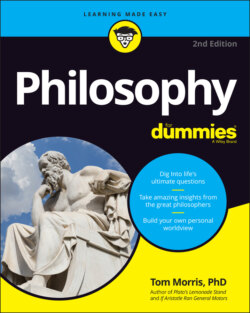Читать книгу Philosophy For Dummies - Tom Morris - Страница 49
Introducing the Ancient Art of Doubt
ОглавлениеThe words skeptic and skepticism come from an ancient Greek verb that meant “to inquire.” Etymologically, then, a skeptic is an inquirer. This should form an important background insight for your understanding of skeptical doubt. Skepticism at its best is not a matter of denial, but of inquiring, seeking, questioning doubt. As long ago as Homer’s Odyssey, we find the striking exclamation: “How prone to doubt, how cautious are the wise!” Wisdom often begins in skeptical questioning, in productive doubt seeking understanding.
The first great skeptical philosopher in the ancient world was Pyrrho of Elis (c. 310–270 BCE). It is said of him that, after traveling with Alexander the Great as a court philosopher, he returned home to teach great crowds of admirers and wisdom seekers. Pyrrho was known for presenting philosophy as a way of life that aims at a calmness of the spirit and happiness of the heart.
This philosopher believed you should always be quick to question and slow to believe. He seemed to think that people too easily can become convinced of things that trouble their minds and disturb their souls. So he practiced and preached withholding judgment, or assent, as much as possible.
Some stories from his time portray Pyrrho as perhaps far too calm, and even indifferent about real dangers in his daily environment. Apparently, his friends were constantly saving his life, pulling him from the paths of speeding carts, from the edges of cliffs, and away from other dangers. Commentators ascribe this to his skeptical disinclination to trust his senses, and thus to a philosophical reluctance to believe anything that appeared to be going on around him. But it’s easy to doubt this, appropriately enough. In graduate school, my best friend and I frequently saved each other’s lives, alternately pulling each other back from the paths of oncoming cars as we walked the streets of New Haven, Connecticut, deep in thought. Our apparent indifference to the dangers around us came about just because we were lost in the intricacies of philosophical reasoning, constructing an argument concerning some abstract issue, and it had nothing to do with the peculiarities of skeptical doubt. Philosophers just tend to get lost in thought, in cities the size of New Haven. Or even Elis.
Other stories about Pyrrho seem more credible and more likely due to his skepticism. There is a report that when a fierce dog attacked him, he reacted with fear, and then later apologized to his friends for not acting consistently with his own philosophy. Another story clearly represents him as attaining this consistency of withholding judgment and experiencing inner calm as a result. He was on board a ship during a violent storm but showed no fear. His terrified fellow passengers asked how he remained calm. In the midst of the fury nature was unleashing, he pointed to a little pig on deck calmly eating his food and said that this is the unperturbed way a wise man should live in all situations.
The city of Elis exempted all philosophers from taxes in honor of Pyrrho, because of his example and his service to the community. And his fellow thinkers would all have been thrilled at this great news, if they just could have brought themselves to actually believe it.
One other notable ancient skeptic was the physician Sextus Empiricus. Little information about his life survives, but it’s assumed that he was Greek because of his knowledge of the language and of places in the Greek world. His works have been very influential and are the best sources for the arguments and positions of classic Greek skepticism. Like Pyrrho, Sextus was no dogmatic naysayer about human knowledge. He didn’t deny its possibility or actual occurrence. He was just extremely careful about committing belief to anything that went beyond immediate appearances, beyond what seems to be, as distinct from what really is, and he urged others on to similar caution.
Any skeptic who was like Pyrrho and Sextus thought people should live in accordance with appearances, or what their senses seem to indicate, but should refrain from drawing any conclusions from those appearances, or avoid any firm beliefs based on the appearances. The point of this caution was always a goal of calmness of spirit, and ultimately a sort of peaceful happiness in life.
